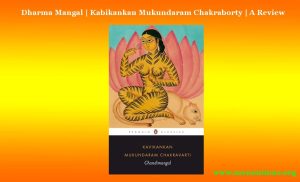Dharma Mangal | Kabikankan Mukundaram Chakraborty | A Review
Dharma Mangal | Kabikankan Mukundaram Chakraborty | A Review
Dharma Mangal by Kabikankan Mukundaram Chakraborty-A Review
“Dharma Mangal” by Kabikankan Mukundaram Chakraborty is a significant piece of Bengali literature and one of the most important works in the medieval Mangal Kavya genre. Composed in the 16th century, this epic poem holds a special place in Bengali literature due to its historical, cultural, and literary significance. Let’s delve into a detailed review of this remarkable work:
Title and Context:
The title “Dharma Mangal” translates to “The Auspicious Glory of Dharma.” The term “Mangal” refers to an auspicious narrative that celebrates virtues, righteousness, and the triumph of good over evil. The work is a Mangal Kavya, a poetic form that emerged in medieval Bengal and was used to narrate heroic and moral tales often involving mythological or historical figures.
Content and Structure:
“Dharma Mangal” is divided into multiple parts, with each part (or “Pala”) focusing on a specific event, character, or theme. The poem primarily revolves around the life and adventures of the legendary Bengali folk hero Dharmaraj. It traces his journey from a divine birth to his various heroic exploits, battles, and eventual ascendancy to a revered position. The poem combines mythological elements, historical narratives, and folk legends, making it a rich tapestry of cultural heritage.
Themes:
Dharma (Righteousness): As the title suggests, the central theme is the celebration of dharma. The poem highlights the importance of righteous actions, moral values, and adherence to one’s duties.
Heroism: The poem portrays Dharmaraj as a heroic figure who embodies courage, loyalty, and selflessness. His actions against injustice and tyranny serve as inspiration for readers.
Cultural Identity: “Dharma Mangal” reflects the cultural identity of medieval Bengal. It incorporates local myths, legends, and historical events that contribute to the collective identity of the Bengali people.
Religious Undertones: The poem integrates religious elements, presenting Dharmaraj as a divine figure chosen to uphold dharma and protect the land from evil forces.
Language and Style:
Mukundaram Chakraborty’s writing style is characterized by its ornate and poetic language. The use of metaphor, simile, alliteration, and intricate wordplay is evident throughout the poem. The work employs a mix of Brajabuli (a medieval form of Bengali) and Sanskrit, showcasing the author’s linguistic prowess.
Impact and Significance:
Cultural Heritage: “Dharma Mangal” is a treasure trove of cultural heritage, preserving historical and mythological elements of medieval Bengal. It contributes to the understanding of the region’s folklore, beliefs, and traditions.
Literary Legacy: The work is an important landmark in the evolution of Bengali literature. It laid the foundation for future epic and narrative poetry in the Bengali language.
Moral Lessons: The poem imparts moral and ethical lessons through the adventures of Dharmaraj, making it not only a literary piece but also a didactic one.
Conclusion:
“Dharma Mangal” by Kabikankan Mukundaram Chakraborty stands as a testament to the rich literary and cultural heritage of medieval Bengal. Its vivid portrayal of heroism, righteousness, and cultural identity resonates with readers even today. The poem’s intricate language, historical insights, and ethical teachings contribute to its enduring significance in the realm of Bengali literature. Whether as a historical document, a cultural artifact, or a literary masterpiece, “Dharma Mangal” continues to captivate the hearts and minds of readers interested in exploring the rich tapestry of Bengali heritage. 0 0 0.
Dharma Mangal | Kabikankan Mukundaram Chakraborty | A Review
Read More: Ravan and Eddie
N. B. The article ‘Dharma Mangal | Kabikankan Mukundaram Chakraborty | A Review’ originally belongs to the book ‘The Reviews of Epic Literature Around the World Vol-I‘ by Menonim Menonimus.
Related Search:
- Epic in Literature








